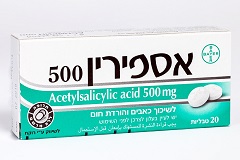Quest for the right Drug

אספירין 500 ASPIRIN 500 (ACETYLSALICYLIC ACID)
תרופה במרשם
תרופה בסל
נרקוטיקה
ציטוטוקסיקה
צורת מתן:
פומי : PER OS
צורת מינון:
טבליה : TABLETS
עלון לרופא
מינוניםPosology התוויות
Indications תופעות לוואי
Adverse reactions התוויות נגד
Contraindications אינטראקציות
Interactions מינון יתר
Overdose הריון/הנקה
Pregnancy & Lactation אוכלוסיות מיוחדות
Special populations תכונות פרמקולוגיות
Pharmacological properties מידע רוקחי
Pharmaceutical particulars אזהרת שימוש
Special Warning עלון לרופא
Physicians Leaflet
Special Warning : אזהרת שימוש
4.4 Special warnings and precautions for use - Hypersensitivity to other analgesics / anti-inflammatory drugs / anti-rheumatics or other allergenic substances (see section 4.3). - Allergies (e.g. skin reactions, itching, urticaria), asthma, hay fever, swelling of the mucosal membrane of the nose (nasal polyps) or chronic respiratory diseases. - Concomitant treatment with anticoagulants (see section 4.5). - History of gastrointestinal ulcers or bleeding. - Impaired hepatic function. - Patients with impaired renal function or patients with impaired cardiovascular blood flow (e.g. renal vascular disease, congestive heart failure, volume depletion, major surgery, sepsis or major haemorrhagic events): Acetylsalicylic acid may further increase the risk of renal impairment and acute renal failure. - Before surgery (including minor surgery such as dental extractions). Bleeding tendency may be increased. - In patients with severe glucose-6-phosphate dehydrogenase deficiency: acetylsalicylic acid may induce haemolysis or haemolytic anaemia. Factors that can increase the risk of haemolysis include high dosage, fever or acute infection. What other precautions must be taken? Prolonged use of analgesics can cause headaches which, if treated with more analgesics, can in turn result in persistence of the headaches. Habitual use of analgesics can lead to permanent kidney damage with the risk of renal failure (analgesic nephropathy). The risk is particularly high when several different analgesics are taken concomitantly. At low doses, acetylsalicylic acid reduces uric acid excretion. This can possibly trigger a gout attack in predisposed patients who already tend to have decreased urine excretion. Children or adolescents Acetylsalicylic acid should not be taken by children or adolescents with febrile illness unless they have been instructed to do so by a doctor and other therapeutic measures have failed. Prolonged vomiting in conjunction with such illnesses could be a sign of Reye’s syndrome, a very rare but life-threatening disease requiring immediate medical attention.
Effects on Driving
4.7 Effects on ability to drive and use machines Acetylsalicylic acid has no influence on the ability to drive and use machines.

שימוש לפי פנקס קופ''ח כללית 1994
Mild to moderate pain, antipyretic, anti-inflammatory, acute rheumatic fever, rheumatoid athritis, prevention of thromboembolic phenomena
תאריך הכללה מקורי בסל
01/01/1995
הגבלות
תרופה שאושרה לשימוש כללי בקופ'ח
מידע נוסף
